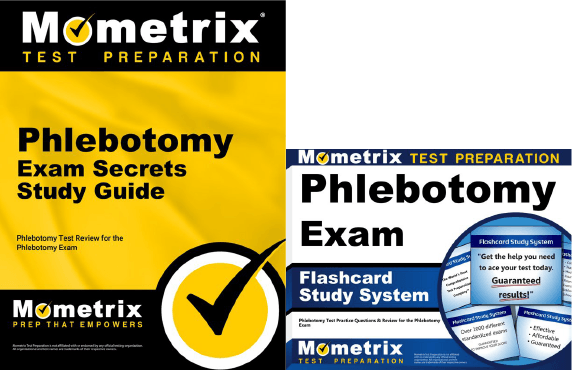If you need help studying for the NHA Certified Phlebotomy Technician (CPT) exam or just want some more information about what the test is like, you’ve come to the right place.
Click below to take a free phlebotomy practice test!
Exam Eligibility
Before you can register to take the NHA Phlebotomy exam, you need to have a high school diploma or GED, and you’ll need to be able to prove you’ve successfully done at least 30 venipunctures and 10 capillary or finger sticks on real people.
You’ll also have to meet ONE of the following two requirements:
- You need to have completed a phlebotomy technician training program within the last 5 years.
- You need at least one year of supervised work experience in phlebotomy within the last 3 years, or two years of experience within the last five years.
If you meet these requirements, you’re set to begin the registration process!
What’s on the Exam?
First, let’s talk about the questions on the exam. There are 120 multiple-choice questions total, but only 100 of the questions will count toward your score. Why is that?
The 20 unscored questions on the exam are called “pretest” questions. These are added to the exam to determine if they’re good enough questions to add to future versions of the test.
The trick is that you won’t have any way of knowing which questions are scored and which ones are pretest. They will appear just like the scored questions throughout the test.
The time limit for the exam is 2 hours. There aren’t any scheduled breaks, but you’re free to take restroom breaks as needed.
The exam is split into the following 5 sections:
1. SAFETY AND COMPLIANCE
25 scored questions
- Adhere to regulations regarding workplace safety and operational standards.
- Adhere to HIPAA regulations regarding protected health information.
- Adhere to scope of practice and comply with ethical standards.
- Perform quality control for laboratory equipment.
- Perform quality control for CLIA-waived tests.
- Identify and dispose of sharps and biohazards according to Bloodborne Pathogens Standard.
- Follow exposure control plans in the event of occupational exposure.
- Follow transmission-based precautions.
- Follow standard precautions regarding personal protective equipment.
- Use aseptic and infection control techniques throughout the phlebotomy process.
- Follow hand hygiene guidelines to prevent the spread of infections.
- Initiate first aid and CPR when necessary.
- Comply with documentation and reporting requirements.
2. PATIENT PREPARATION
23 scored questions
- Introduce yourself to the patient and provide information.
- Positively identify the patient based on specific identifiers while following HIPAA guidelines.
- Receive implied, informed, or expressed consent from the patient.
- Review and clarify the requisition form.
- Verify patient compliance with testing requirements and proceed accordingly.
- Interview patients to identify special considerations and proceed accordingly.
- Explain the phlebotomy procedure to be performed to the patient.
- Position the patient to maximize comfort and safety, and optimize specimen collection.
- Determine site for specimen collection to minimize patient risk and optimize outcome.
- Instruct patients on collection of non-blood specimens.
3. ROUTINE BLOOD COLLECTION
30 scored questions
- Select and assemble equipment for blood collection.
- Verify quality of equipment.
- Follow standard tourniquet application and removal procedures.
- Select final site through observation and palpation for specimen collection.
- Apply antiseptic agent to blood collection site.
- Anchor below venipuncture site.
- Insert venipuncture device.
- Follow order of draw when performing venipuncture.
- Ensure patient safety throughout the collection by identifying problematic signs and symptoms.
- Recognize and respond to potential complications resulting from procedure.
- Remove venipuncture device.
- Invert evacuated tubes with additives according to procedural guidelines.
- Perform dermal puncture for capillary collection based on patient age and condition.
- Follow order of draw when performing capillary collection.
- Label all specimens.
- Perform post-procedural patient care.
4. SPECIAL COLLECTION
7 scored questions
- Prepare peripheral blood smears.
- Perform blood culture collections.
- Assist other healthcare professionals with specimen collection.
- Collect blood samples for inborn errors of metabolism.
- Perform phlebotomy for blood donations.
- Calculate volume requirements in high-risk patients to avoid causing iatrogenic anemia.
- Perform non-blood specimen collection.
5. PROCESSING
15 scored questions
- Prepare specimens for testing or transport.
- Maintain integrity of specimens based on handling requirements.
- Adhere to chain of custody guidelines.
- Coordinate communication between non-laboratory personnel for processing and collection.
- Input and retrieve specimen data using laboratory information system.
- Recognize and report critical values for point of care testing.
How to Register
Once you’ve ensured that you meet all of the eligibility requirements, you can register for the exam.
To get started, you’ll need to an NHA account on their website. From there, you can select the CPT exam and begin the registration and scheduling process. You’ll be asked a handful of questions along the way to ensure you meet the eligibility requirements for the exam.
The fee for the exam is $125.
Exam Scores
The exam is scored using a scaled scoring method. Here’s how it works:
A passing score is a scaled score of at least 390.
The reason your raw score is converted to a scaled score is because everyone who takes the exam is given a slightly different set of questions. Since everyone has a different arrangement of questions, and because some questions are harder than others, converting your raw score to a scaled score ensures a more even playing field.
Online NHA Phlebotomy Prep Course
If you want to be fully prepared, Mometrix offers an online NHA Phlebotomy Prep Course. The course is designed to provide you with any and every resource you might want while studying. The NHA Phlebotomy Course includes:
- 30+ Review Lessons Covering Every Topic
- 800+ NHA Phlebotomy Practice Questions
- More than 300 Digital Flashcards
- Money-back Guarantee
- Free Mobile Access
- and More!
The NHA Phlebotomy Prep Course is designed to help any learner get everything they need to prepare for their NHA Phlebotomy exam. Click below to check it out!
Retaking the Exam
If you didn’t get a passing score on your first try, that’s okay! You can retake the test after a mandatory 30-day waiting period.
FAQs
How many questions are on the NHA Phlebotomy exam?
The exam contains 120 multiple-choice questions.
What is the time limit for the NHA Phlebotomy exam?
The exam is timed at 2 hours.
How much does the NHA Phlebotomy exam cost?
The testing fee is $125.
What is a passing score for the NHA Phlebotomy exam?
To pass, you’ll need to score at least 390.
Self-Assessment Module
One of the most important parts of preparing for a test is determining which topics you need to brush up on as you study.
Click below to get started with a self-assessment of your knowledge!



 NHA Phlebotomy Online Course
NHA Phlebotomy Online Course Phlebotomy Study Guide
Phlebotomy Study Guide Phlebotomy Flashcards
Phlebotomy Flashcards

